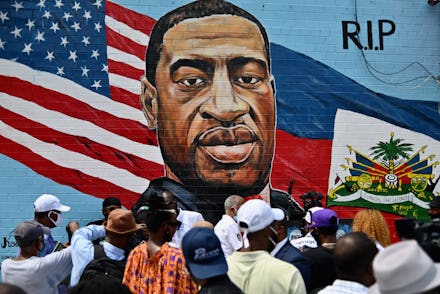"He just stayed on my neck": Eyewitnesses recount Derek Chauvin's history of violent arrests

In about two months, the former police officer who killed Minneapolis resident George Floyd will stand trial. Derek Chauvin, who knelt on Floyd's neck for nearly nine minutes, will face charges of manslaughter and second-degree murder.
A video of the police killing circulated on social media shortly after the attempted arrest of Floyd, for allegedly using a counterfeit $20 bill, on May 25, 2020. The video evidence spurred a summer of protests in defense of Black lives. In the video, the 47-year-old father can be heard screaming "I can't breathe!" as Chauvin refuses to relieve the pressure on Floyd's neck. Three other officers who responded to the 911 call can be seen watching on the side Chauvin kills Floyd.
A new report from The Marshall Project, a nonprofit journalism outlet focused on criminal justice, sheds light on how this type of behavior was commonplace from Chauvin. Per The Marshall Project, Chauvin was violent toward a number of arrestees during his more than 19 years with the Minneapolis Police Department — including a number of strikingly similar instances where Chauvin knelt on a suspect's neck. Prosecutors hope that the multiple accounts of Chauvin's behavior will demonstrate a pattern of abuse — and give jurors reason to convict him in Floyd's death.
Zoya Code, whom Chauvin arrested in 2017, told The Marshall Project of Chauvin, "He just stayed on my neck." Chauvin pressed harder just to show that he could, she claimed. Another individual, Jimmy Bostic, who was arrested in 2016, recounted: "The next thing I felt was arms just wrapped around my neck," he said to The Marshall Project. "I started telling him, 'Let go, I’m having trouble breathing. I have asthma. I can’t breathe.'" Another man who witnessed Chauvin's treatment of an individual under arrest told The Marshall Project that in 2019, Chauvin essentially water-boarded a 26-year-old in a puddle: "He said, 'I can’t breathe — can I just put my head up?'" the witness, a 74-year-old named Monroe Skinaway, said. "And they just held his face in the water, and I couldn't see a purpose for that."
Four of the six people whose experiences prosecutors intend to bring forward during the trial are people of color, with the races of the other two individuals not cited in arrest reports. "[Black people] accounted for more than 60% of the victims in Minneapolis police shootings from late 2009 through May 2019, data shows," per The New York Times. For added context, the non-white population of the Twin Cities — Minneapolis and St. Paul — is around 20%.
Despite having a history of violence toward Minneapolis residents and at least 17 misconduct complaints against him, Chauvin was never formally reprimanded. Per the Times, Chauvin's record did include the following: "He was admonished for using derogatory language and a demeaning tone with the public. He was named in a brutality lawsuit. But he received no discipline other than two letters of reprimand."
Moreover, the Minneapolis Police Department as a whole had been reviewed by a federal board and subjected to numerous civilian review boards. But none of these measures prevented Chauvin from responding to a call for backup on May 25, 2020 for suspected use of a counterfeit $20 bill.